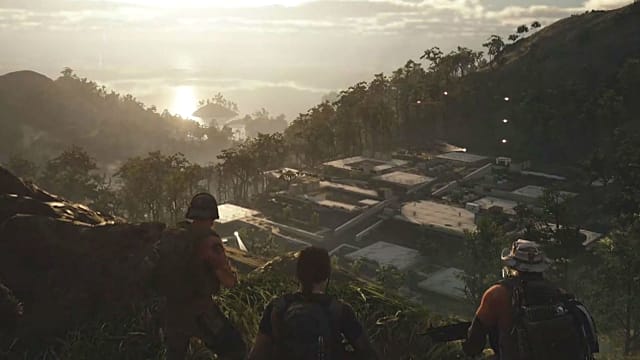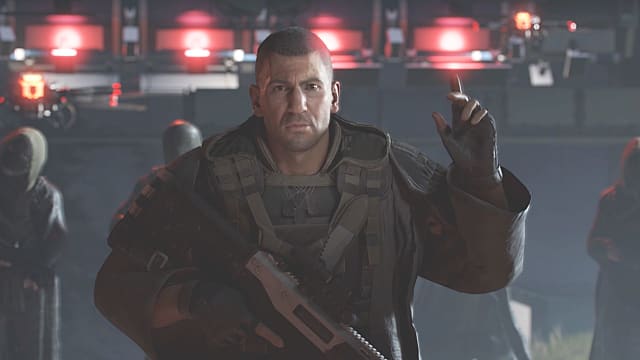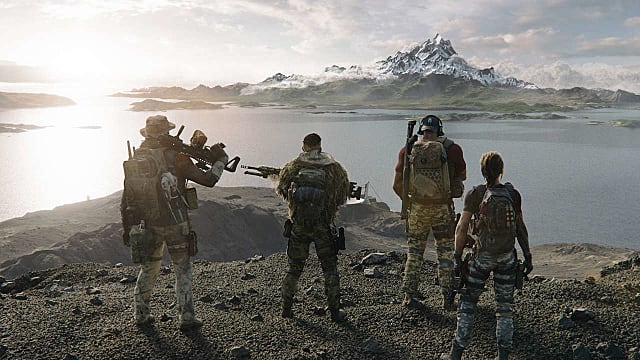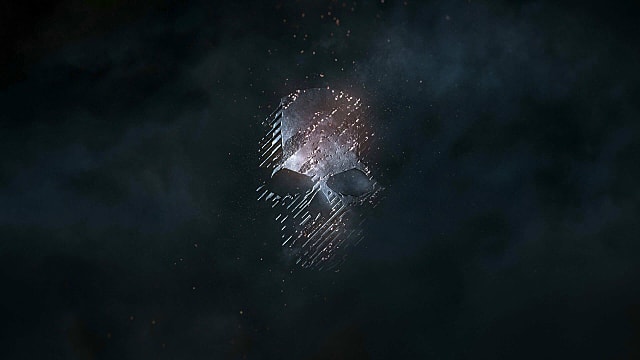

Ghost Recon Breakpoint attempts to be many things: a tactical shooter, a loot game, an open-world exploration game, a cautionary tale about the lengths we'll go to achieve our ideals.
It is, at its heart, sincere in its attempts to be any of those things. It sees the value in them and makes an honest attempt to adapt those systems and structures to those ends. At times, Breakpoint succeeds. When it succeeds, there are powerful, emergent stories that write themselves.
Even the overarching narrative has its strong points that make powerful, if overly familiar, points about war, and what we'll do for the people we care about.
Breakpoint does, however, find itself looking for an identity with no grounding. It tries to chase every popular trend without understanding why those trends are popular in the first place.
A Box of Empty Sand
Ubisoft has made a name for itself by creating open worlds full of things to do, places to see, people to meet, and lives to change. Games like Assassin's Creed: Black Flag and Watch Dogs 2 are full of new, emergent stories. Each has fascinating locations full of grand vistas that wow the eyes and kindle a love for exploration. They are also full of tangible, engrossing history.
Ghost Recon Breakpoint has none of these things. The Auroa archipelago can be beautiful, but its beauty is bland. The same trees for miles, dirt roads next to grey rock mountains, green-blue water that offers nothing for the eye.
More often than not, I couldn't be bothered enjoying the scenery because there was nothing to look at. Everything felt generic.
This sensation is something Ubisoft was at least somewhat aware of. They've built both easter-eggs and hints at an ancient island culture into the game.
Idols, shrines, and other iconography pepper Auroa; they entice players with a mystery of what came before the Skell Tech corporation. There are even moments of surprise when the old and the new clash, where military or future-tech installations seem at war with one another and the landscape around them.
The problem is, these moments are too few and far between. Breakpoint's world is more filled with the same kinds of busywork we've come to expect from Ubisoft's later titles. Go to this location and pick up this item, then do it again and again.
It doesn't take long for your map to fill with "locations of interest," which rarely take more than a few minutes to clear correctly, provided there are enemies to shoot. Each location might only net you a few thousand "Skell Credits," the game's in-world currency, but not much more.
There are hundreds of these little nooks and crannies, and after a few hours of exploring, they tend to blend, even if one or two seem interesting at first.
The various towns, villas, science outposts, and futuristic locations offer a little more variety. Each of them is different enough from the others to break up the otherwise monotonous traversal. For one thing, there's usually at least one person to talk to or otherwise interact with, even if it involves just shooting them.
I will say that there's a lot of love and thought put into the various installations scattered across the island. The secret weapons lab and waterlogged research campus are highlights, but I can't say I'd have ever found them if there wasn't an objective marker leading me there.
Breakpoint ultimately suffers from the opposite problem Rage 2 did: instead of too little to do, it has too much that doesn't matter. There are bright spots of; interesting lore and intricate worldbuilding, but I tend to go bleary-eyed if my map's filled with hundreds of icons that offer nothing for me.
A Story at Odds With Itself
There is ambition in Ghost Recon Breakpoint's storytelling. Buried beneath the generic plotline and underwhelming characters could be a nuanced take on what the future holds for us, and what that means for soldiers and civilians alike.
There are hints of human tragedy and horror, of what it means to push someone to the brink and what they'll do once they've slipped past it. In ways, I was sometimes touched by the counterpoints created between Nomad, the player character, and Cole, the main antagonist. Most of all, though, I found myself hoping for a story about where "the line" was, and what it might mean to redraw it.
Sadly, such a narrative never materializes. Instead, we have a main character who is The Good Person and Cole, the villain, who is the Monster with a Heart. All around them are cardboard cutouts we've seen a thousand times. The Genius Scientist, The Preppy Tech Company CEO, The Grizzled Old Man, and The Plucky Child Who Is Always Happy Until She Isn't.
I might forgive weaker characters if they stood in a stronger story, but there are as many problems with this narrative as anything else in the game. One of the core conceits of Breakpoint's story is about how Cole, gone off the rails, will engage in any depravity if it serves his purpose.
Nomad is supposed to represent a kind of moral high ground, killing because they must and using only the force necessary to accomplish the mission. The problem? Nomad probably kills more people than Cole's forces ever do, and the only reason everyone's okay with it is because they're killing the "bad guys."
There's even a moment where Cole and Nomad argue about how "you killed my soldiers," and never once do they acknowledge that both of them are monsters. It's only Cole who's gone too far.
Worst of all is Cole's endgame. While I won't spoil it in case you play the game yourself, what he wants is idealistic in the extreme and takes the idea of "ends justifying the means" to a ridiculous level. It's a thing built atop a house of cards, a goal not worth having if the way you get there is so soaked in blood you ooze red.
A Gray Horizon
Several other problems don't warrant full sections but are worth mentioning.
The enemy AI is laughably inadequate, and at one point, I saw a whole group of them all but bumping into one another trying to work through their walk cycles. For a game that bills itself as a "tactical experience," the conga line of soldiers running into my bullets doesn't bode well.
There are plenty of bugs, too. The only time I didn't load into the game with empty hands was just after the opening cutscene. I found myself clipping through geometry more times than I'd like to count, and some vital screens wouldn't load for minutes at a time, if at all.
Tutorial overlays — and quest information in general — are poorly implemented, as well. Everything has a tutorial that plays a sound bite and clogs up the screen for a good minute every time the game opens.
The quest screen itself is too large for any monitor to contain, and is made up of so many menus and submenus I could never keep straight what I was or wasn't doing.
And while it's a small thing, the fact that speaking animations are so much worse outside of cutscenes always threw me. Borderlands 3 and Destiny 2 — games with plenty of in-game dialogue — never have that kind of problem. But in Breakpoint, the facial animations are almost always jarringly fake.
There are a few bright spots, however. The feeling of taking down a few targets in quick succession while avoiding their larger group of friends isn't something you'll find most places. The gunplay, too, isn't terrible. It isn't great, but I never felt like I was using anything except a weapon of war.
I was also kind of a fan of the loot system, as I'm kind of a sucker for that kind of progression. It doesn't need to exist, but it is always fun optimizing a new build.
Pros:
- Workable combat
- Generally good music
- Uninteresting but fun progression
Cons:
- Boring
- Horrid Microtransactions
- Poorly written story and flat characters
- Mediocre worldbuilding
- An empty world filled with too much busywork
Breakpoint cannot free itself from the trap of being too many things in too large a space. Its world feels barren in its vastness. Its story is hamfisted, and its characters are flat and uninteresting.
Most of all, it commits the ultimate sin for any piece of entertainment: it's boring. For all the moments of levity and enjoyment, there is far too much time spent doing nothing of any interest.
Traversing the world is a slog. The combat, though functional, lacks character. The enemies aren't worth a bag of sand, and if I can't even enjoy the look of the sunset on the horizon, I can think of a hundred reasons why I would want to be playing anything else.
[Note: A copy of Ghost Recon: Breakpoint was provided by Ubisoft for the purpose of this review.]




0 comments:
Post a Comment